Welcome to our comprehensive guide on music copyright laws in the United States. In this article, we will delve into the complexities of music copyright, exploring topics such as rights, licensing, fair use, music industry regulations, and the importance of copyright protection for artists and creators.
Key Takeaways:
- Music copyright laws in the U.S. govern the rights and licenses associated with music creation and distribution.
- Fair use allows limited use of copyrighted material, but the guidelines can be subjective.
- Understanding different types of music licenses and royalty rights is important in the music industry.
- Copyright duration varies depending on the type of work and when it was created.
- Infringing on music copyrights can lead to penalties and legal consequences.
Understanding Music Copyright and Intellectual Property.
When it comes to protecting creative works in the music industry, copyright plays a crucial role. Copyright is a form of intellectual property protection that grants exclusive rights to the creator of an original work. In the context of music, these rights encompass the composition itself, as well as the sound recording.
In the United States, copyright law is overseen by the Copyright Office, a governmental agency responsible for the registration and administration of copyrights. The Copyright Office plays a vital role in protecting copyrighted material from infringement, ensuring that creators have the necessary tools to safeguard their works.
For artists and creators, understanding their rights as copyright holders is essential. By registering their works with the Copyright Office, they can establish ownership and gain additional legal protections. Copyright registration provides evidence of ownership, making it easier to enforce rights and pursue legal action in cases of infringement.
Also Read: Exploring The Premier Music Colleges For Career Advancement
Copyright infringement, the unauthorized use of copyrighted material, is a serious offense that can have significant consequences. Infringement can occur when someone reproduces, distributes, performs, or displays a copyrighted work without permission from the copyright holder. It is important for creators to be vigilant in protecting their rights and taking action against infringement.
“Copyright is a form of intellectual property protection that grants exclusive rights to the creator of an original work.”
Copyrighted Song Example
To provide a practical example, let’s consider a popular song such as “Bohemian Rhapsody” by Queen. As the creators and copyright holders of the song, Queen and their publishing company have the exclusive rights to control how it is used and distributed. This includes the reproduction of sheet music, the creation of cover versions, and the synchronization of the song in films or advertisements.
Any unauthorized use of “Bohemian Rhapsody” would infringe upon Queen’s copyright, potentially leading to legal action and the imposition of penalties. This example illustrates the importance of respecting copyright and obtaining proper permissions when using copyrighted material.
Intellectual Property and Beyond
Music copyright is just one aspect of intellectual property protection in the music industry. Other forms of intellectual property, such as trademarks and patents, also play a vital role. Trademarks serve to protect branding elements such as band names and logos, while patents are used to protect inventions and technological innovations in the music field.
Also Read: Insider Tips On Music University Scholarships For International Students
Types of Music Copyrights and Licenses.
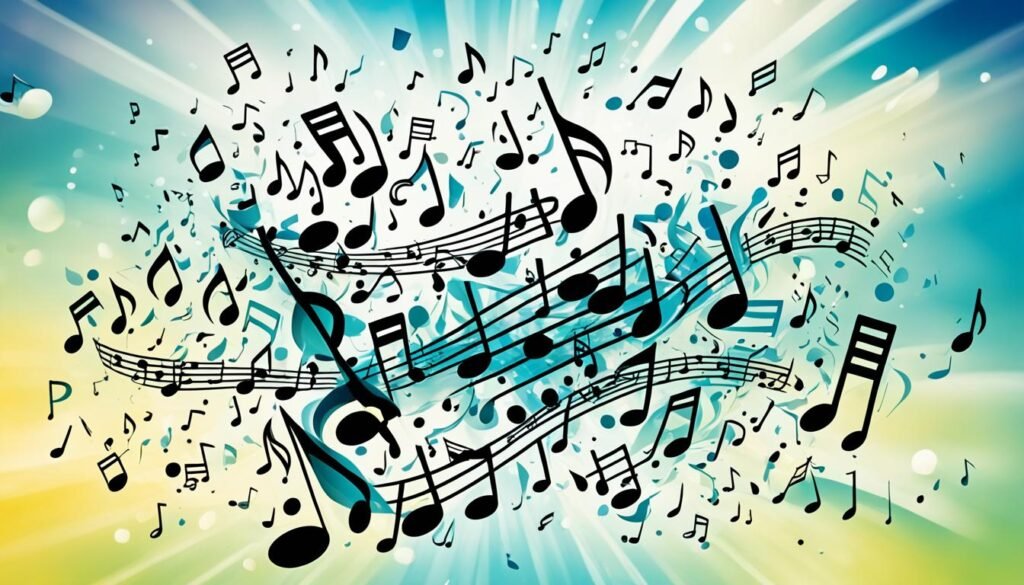
In the world of music, there are various types of copyrights and licenses that play a crucial role in protecting and managing creative works. Understanding these different aspects is essential for artists, creators, and music industry professionals. Let’s explore the key components of music copyrights and licenses.
Musical Work Copyright
A musical work copyright protects the written composition of a piece of music. It grants exclusive rights to the composer or songwriter, allowing them to control and monetize their work. This copyright safeguards the melody, lyrics, and arrangement of the composition, ensuring that others cannot reproduce or profit from it without permission.
Sound Recording Copyright
In addition to musical work copyrights, sound recording copyrights protect specific recorded versions of a musical composition. This copyright covers the particular performance and production elements of a song, including the artist’s interpretation, instrumental accompaniment, and engineering techniques employed in the recording process. It ensures that the recorded version remains the property of the copyright owner.
Also Read: How Music University Enhances Academic And Creative Growth
Music Licenses
Music licenses are legal agreements that grant individuals or entities permission to use copyrighted material. These licenses regulate the usage of musical works or sound recordings for various purposes, such as synchronization in films, TV shows, or advertisements, public performances, mechanical reproductions, digital streaming, and more.
The process of obtaining a music license can vary depending on the intended use. Music publishers are often involved in granting licenses for musical compositions. For sound recordings, licenses can be obtained through music labels or digital rights management organizations such as ASCAP, BMI, or SoundExchange.
Royalty Rights
Royalty rights are an integral part of music licensing. They ensure that creators are appropriately compensated for the use of their work. When a musical composition or sound recording is licensed, the copyright owner receives royalties, which are payments for the authorized usage. These royalties can be collected through performance rights organizations or music publishing companies.
By granting licenses and enforcing royalty rights, the music industry maintains a fair and sustainable ecosystem that rewards artistic creation and encourages the continued production of exceptional music.
Please refer to the table below for a comprehensive overview of the different types of music copyrights and licenses:
Understanding the intricacies of music copyrights and licenses is vital for all stakeholders in the music industry. By navigating the complexities of regulations and ensuring proper licensing, artists, creators, and music industry professionals can protect their work, receive fair compensation, and contribute to a vibrant and thriving musical landscape.
Also Read: Why Every School Needs A Vibrant Music Education Program
Fair Use and Music Copyright.
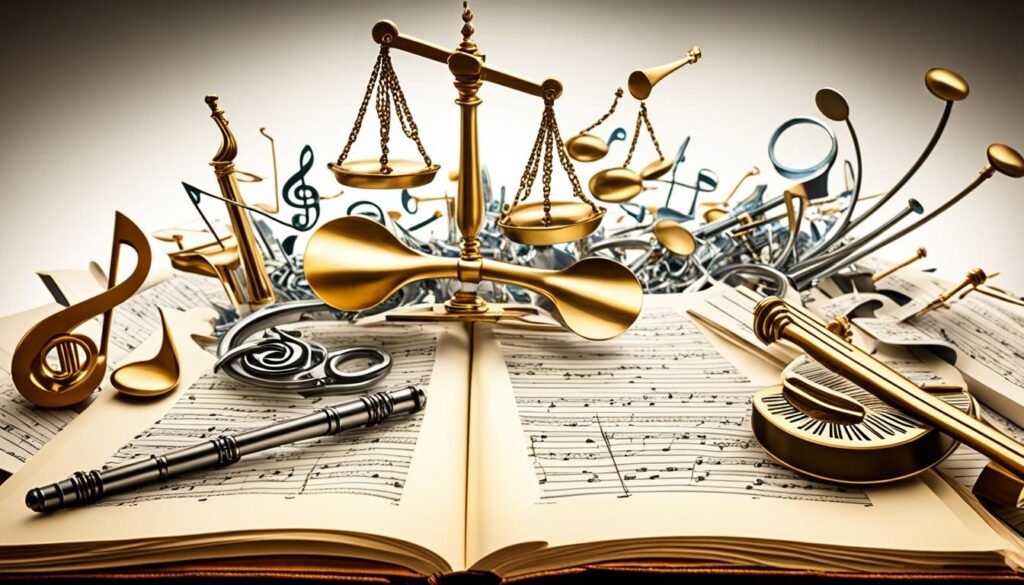
Fair use is an exception to copyright law that allows for limited use of copyrighted material without permission from the copyright owner. It provides flexibility in utilizing copyrighted works for purposes such as commentary, criticism, parody, research, and teaching.
Determining what qualifies as fair use can be subjective. The four factors considered are:
- The purpose and character of the use: Whether the use is transformative, non-profit, or commercial.
- The nature of the copyrighted work: Whether it is factual or creative in nature.
- The amount and substantiality of the portion used: How much of the work is used in relation to the whole.
- The effect on the market for the original work: Whether the use negatively impacts the potential market value.
Music, being a creative and expressive art form, often involves derivative works, remixes, and sampling. Fair use considerations play a significant role in determining the legitimacy of these practices. However, taking a substantial portion of a copyrighted musical work without permission is more likely to be deemed infringing.
It’s important for artists and creators to be aware of licensing options and tools such as the Creative Commons. Creative Commons licenses provide a framework that allows creators to give permission in advance for others to use their work under certain conditions. These licenses help simplify the process of obtaining permission for use and prevent unintentional infringement.
Also Read: Unlocking The Secrets Of Top Jazz Music Universities
Infringement of music copyright can have legal ramifications and result in legal action, damages, and injunctions. Artists and creators should be mindful of the rights of copyright owners and seek permission when necessary. Music streaming platforms, for example, typically obtain licenses from copyright owners to ensure they have the rights to make copyrighted music available for public performance.
The fair use doctrine plays a critical role in striking a balance between protecting the rights of copyright owners and fostering creativity and freedom of expression. It allows the public to benefit from the use of copyrighted material in a manner that is reasonable, transformative, and does not unfairly compete with the original work.
Example of Fair Use in Music
One prominent example of fair use in the music industry is the use of samples in hip-hop music. Sampling involves taking a portion of a pre-existing song and incorporating it into a new composition. While the use of samples typically requires permission and licensing, some instances have been recognized as transformative fair use. In the landmark case of Bridgeport Music, Inc. v. Dimension Films, the court held that N.W.A.’s use of a two-second guitar riff from George Clinton’s song was transformative and constituted fair use.
| Original Work | Transformative Use | Result |
|---|---|---|
| George Clinton’s song | N.W.A.’s use of a two-second guitar riff | Fair use; transformative |
Copyright Duration and Expiration.
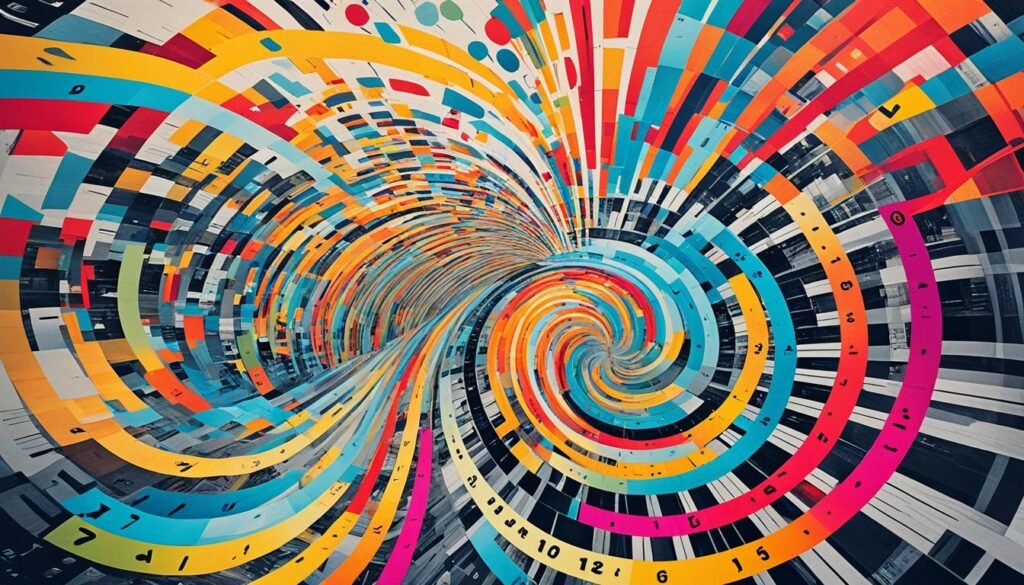
Copyright duration varies depending on the type of work and when it was created. Works created after January 1, 1978, are generally protected for the life of the author plus 70 years. However, for works created before that date, copyright protection lasts for either 95 years from the date of publication or 120 years from the date of creation, whichever is shorter.
Once a copyright has expired, the work enters the public domain, which means it can be used freely without permission from the copyright owner.
| Type of Work | Copyright Duration |
|---|---|
| Works created after January 1, 1978 | Life of author plus 70 years |
| Works created before January 1, 1978 | 95 years from publication or 120 years from creation, whichever is shorter |
Once copyright protection has expired, anyone can use the work without the need for permission. This allows for the free distribution, adaptation, and public performance of the work.
“The duration of copyright protection is an essential aspect of intellectual property law. Understanding these durations is crucial for both creators and users of copyrighted works.”
Music Copyright Infringement and Penalties.
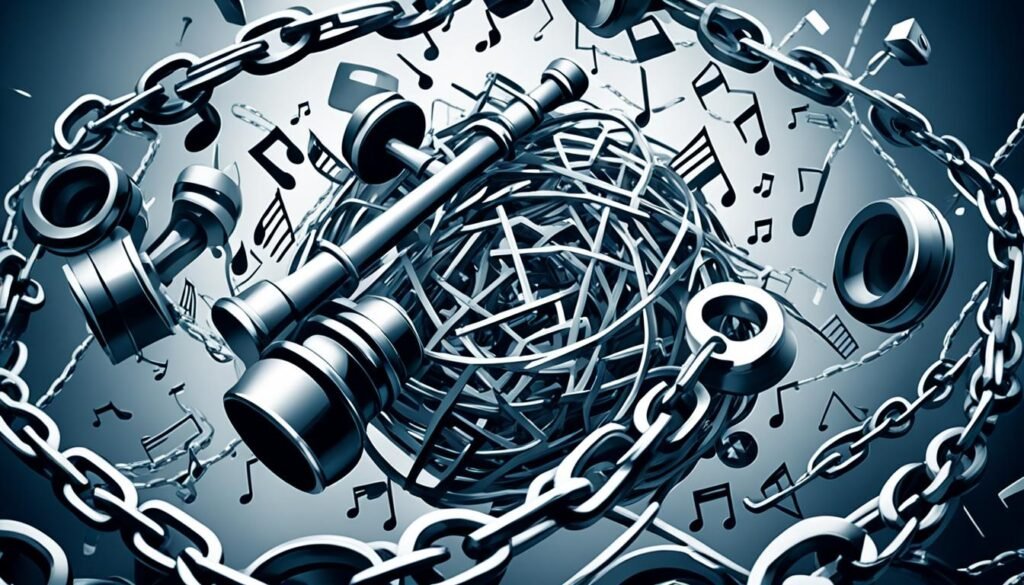
Music copyright infringement occurs when someone uses copyrighted material without authorization from the copyright owner. Unauthorized use of copyrighted material is a violation of intellectual property rights and can result in severe penalties. If a court finds that infringement has occurred, the infringer may be held liable for statutory damages.
Statutory damages are monetary awards set by law to compensate the copyright owner for the infringement. The amount of statutory damages can vary depending on the severity of the infringement and is determined by the court. These damages serve as a deterrent for future infringements and as a means to provide fair compensation to the copyright owner.
Willful infringement for commercial advantage is considered a more serious offense and can lead to higher penalties. If an infringer knowingly and intentionally uses copyrighted material to gain a commercial advantage or financial benefit, the court can impose stricter penalties to deter such behavior.
When a court finds an infringer guilty of music copyright infringement, it can order various remedies, including injunctive relief to stop further unauthorized use, damages to compensate the copyright owner for losses, and the payment of legal fees incurred during the litigation.
It is crucial for artists, creators, and copyright holders to be vigilant in protecting their copyrights and taking legal action if their rights are violated. Registering copyrights, monitoring unauthorized use of their works, and consulting with legal professionals can help safeguard their intellectual property and ensure they receive the appropriate legal remedies in case of infringement.
“Copyright infringement is a serious matter that undermines the rights of artists and creators. By taking legal action, copyright owners can protect their work, preserve their livelihoods, and send a strong message against unauthorized use.”
Music Copyright for Educators and Performers.
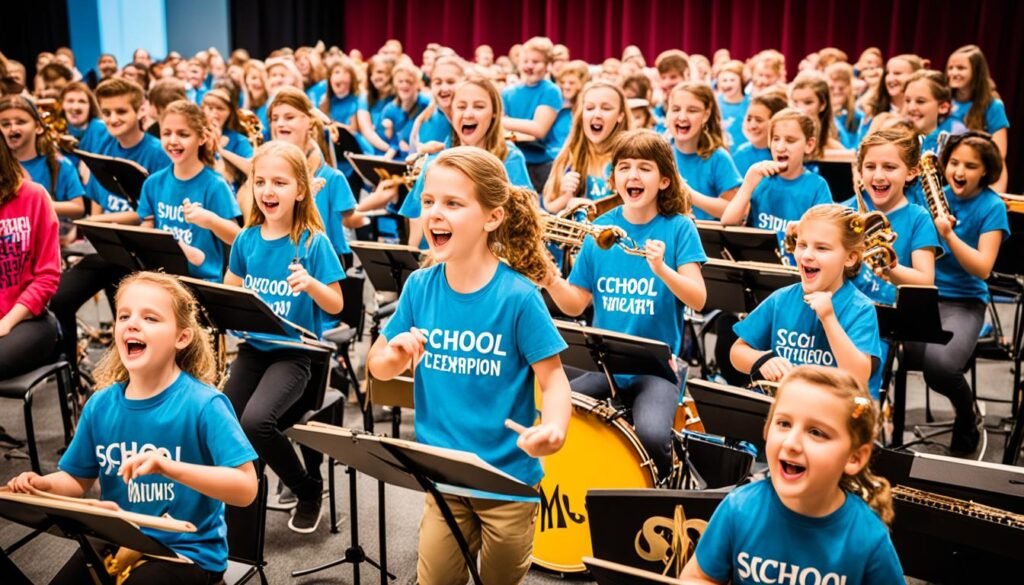
Music copyright laws apply to educators and performers alike, ensuring that the rights of creators are protected. It is important for music educators to obtain the necessary licenses to use copyrighted music in educational settings, in compliance with copyright law. However, there are exemptions that allow for performances of copyrighted material in schools and other educational institutions.
Performers, such as musicians and singers, must also be mindful of copyright laws when performing copyrighted material in public. Obtaining the proper permissions and licenses is essential to respect the rights of the copyright owner.
Furthermore, understanding the concept of a “performable unit” is crucial for educators and performers. A performable unit refers to a part of a copyrighted work that can be performed without obtaining permission. This concept allows for flexibility and creativity while still adhering to copyright regulations.
Example: Performable Unit
For example, if a music teacher wants to perform a popular song with their students during a school concert, they may only need permission to perform a specific section or arrangement of the song, rather than the entire composition. This allows educators to create performable units that suit their needs while respecting copyright laws.
| Situation | Performable Unit Required |
|---|---|
| School Concert | Permission to perform selected sections of copyrighted songs. |
| Classroom Lesson | No performable unit required if used for educational purposes under fair use. |
| Online Performance | Permission to publicly perform copyrighted songs in whole or in part. |
By understanding the intricacies of music copyright as an educator or performer, individuals can navigate the legal landscape while still engaging with the beauty and power of music.
Music Copyright and Digital Music Providers.

With the rapid growth of digital music platforms, the role of digital music providers in ensuring copyright protection has become increasingly crucial. These platforms serve as intermediaries between artists and music consumers, making it essential for them to navigate the complex landscape of copyright regulations.
Digital music providers must obtain the necessary licenses from copyright holders in order to legally distribute copyrighted music. These licenses grant them the right to make copies, download, or stream music legally. Without proper permission from the copyright owner, digital music providers risk infringing on the rights of artists and creators.
Users of these platforms also have a responsibility to ensure that they are abiding by copyright laws. While digital music providers obtain licenses to distribute music, users must obtain permission from the copyright owner when using copyrighted material in ways that go beyond personal consumption. This includes making copies, downloading, or streaming music for public performances or commercial purposes.
Making illegal copies of copyrighted music is a violation of copyright law and can result in severe penalties. By respecting the rights of copyright owners and obtaining proper permission, both digital music providers and users can contribute to a sustainable and fair music ecosystem.
“Digital music providers play a critical role in safeguarding copyrights and ensuring fair compensation for artists and creators. As the digital landscape continues to evolve, it is paramount for these platforms to prioritize copyright protection.”
To better understand the responsibilities of digital music providers and users, let’s take a closer look at the permissions required and the consequences of making illegal copies.
Permissions Required
When using copyrighted music through digital music platforms, users need to understand and comply with the permissions required for various activities. These permissions typically include:
- Making personal copies for personal use
- Downloading and streaming music for personal listening
- Performing music publicly
- Using music in commercial projects
For each of these activities, users must obtain permission from the copyright owner or obtain the necessary licenses through digital music providers. Failure to do so may result in legal consequences.
Consequences of Making Illegal Copies
Making illegal copies of copyrighted music can have severe repercussions. Not only does it undermine the rights of artists and creators, but it also diminishes the value of their work and can negatively impact the music industry as a whole. Here are some potential consequences:
| Consequences | Description |
|---|---|
| Legal penalties | Fines, damages, and legal costs associated with copyright infringement |
| Takedown notices | Copyright holders may issue takedown notices to remove infringing content from platforms |
| Loss of reputation | Artists and creators may face reputational damage if their work is used without permission |
| Economic loss | Reduced income for artists and creators due to unauthorized use of their work |
| Loss of future opportunities | Infringing on copyrights can limit future collaborations and licensing opportunities |
Ultimately, it is essential for digital music providers and users to understand the importance of copyright protection and to comply with the necessary permissions and licenses. By doing so, they can contribute to a thriving music industry that respects the rights of artists and creators.
Conclusion.
In conclusion, understanding the intricacies of music copyright laws is vital for artists, creators, educators, and performers. By gaining knowledge about the different types of copyrights, licenses, and the concept of fair use, we can protect the rights of copyright owners and foster a thriving music industry.
To simplify the copyright process, it is essential to seek guidance from publishers and licensing organizations. They can provide valuable information and assistance in navigating the complexities of song’s copyright. Additionally, it is crucial to respect the exclusive rights of copyright owners and obtain proper permissions before using their work.
Should you have any questions regarding copyright ownership or licensing, don’t hesitate to contact the publisher or the copyright owner directly. By working together and ensuring that all involved parties adhere to copyright laws and regulations, we can promote creativity and innovation while giving due credit and protection to the original creators.
Ultimately, by simplifying the copyright landscape and respecting the exclusive rights of copyright owners, we can create a balanced and thriving music industry that encourages the growth and success of artists and creators.
Also Refer : Creating Valuable Music Industry Connections
FAQs
Q: What is copyright and how does it relate to music?
A: Copyright refers to the legal protection of creative works, including music. It grants the creator the exclusive right to reproduce, distribute, and perform their work. In the context of music, copyright protects musical compositions, lyrics, and recordings.
Q: What is the Music Modernization Act?
A: The Music Modernization Act is a U.S. law that aims to streamline the process of licensing and distributing music. It includes provisions for mechanical licensing, royalty payments, and the creation of a comprehensive database of musical works to ensure proper compensation for rights holders.
Q: How can I know if a musical work is protected by copyright?
A: Generally, original musical works are automatically protected by copyright as soon as they are created and fixed in a tangible form, such as written or recorded. It’s important to note that copyright protection does not extend to ideas or concepts, but rather the expression of those ideas.
Q: What should I do if I want to use a copyrighted musical work?
A: In order to use a copyrighted musical work for purposes such as reproduction, distribution, or public performance, you typically need to obtain the permission of the copyright owner or license the work through a designated licensing agency.
Q: What is the procedure for registering a musical work with the U.S. Copyright Office?
A: To register a musical work with the U.S. Copyright Office, you would need to complete the appropriate application form, pay the required fee, and submit a copy or recording of the work. Registration provides evidence of ownership and is necessary to file an infringement lawsuit.
Q: What are the implications of creating derivative works based on copyrighted musical compositions?
A: Creating derivative works, such as remixes or adaptations, based on copyrighted musical compositions typically requires the permission of the copyright owner. Failure to obtain proper authorization may result in copyright infringement.
Q: What is the “fair use” doctrine in the context of using copyrighted musical works?
A: The “fair use” doctrine allows for the limited use of copyrighted material without the permission of the copyright owner for purposes such as criticism, comment, news reporting, teaching, scholarship, and research. However, the determination of fair use is based on several factors and is subject to interpretation by the courts.
Q: What role do performing rights organizations (PROs) such as BMI and SESAC play in music copyright?
A: Performing rights organizations represent songwriters and music publishers by licensing the public performance of musical works and collecting royalties on their behalf. They play a crucial role in ensuring that creators receive compensation for the use of their music.
Q: Can I use copyrighted music for a school concert or educational purposes without permission?
A: There are certain exemptions and provisions in copyright law that allow for the use of copyrighted music in educational settings, such as the school concert exemption. However, it’s important to familiarize yourself with the specific requirements and limitations of such exemptions.
Q: What are the potential consequences of copyright infringement related to music?
A: Copyright infringement in the context of music can lead to legal consequences, including the possibility of facing an infringement lawsuit, being liable for damages, and being required to cease the unauthorized use of the copyrighted material.




